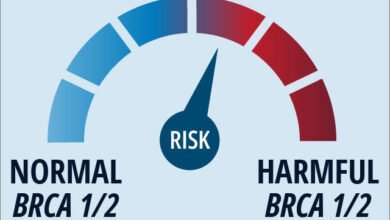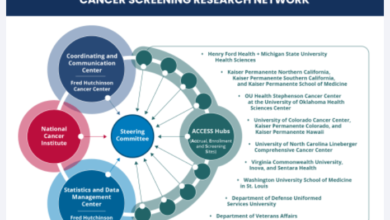Cancer Research UK – Science blog

When cancer is diagnosed, doctors will carry out tests to determine how big the tumour is, and whether it has spread into any other tissues or parts of the body.
Once they know that information, they can assign the cancer a stage.
Typically, this ranges from stage 1, meaning the cancer is small and hasn’t spread beyond where it first started, to stage 4, meaning the cancer has spread from where it started to another body organ.
Cancers diagnosed at an earlier stage, before they’ve had the chance to grow and spread, are more likely to be treated successfully. So, minimising any delays to detecting cancers, and therefore catching them at the earliest possible stage, is paramount to improving cancer survival.
However, previous research has suggested that there are inequalities between some groups when it comes to being diagnosed with cancer at later stages.
Research on breast cancer in particular has suggested that there are differences in proportions of patients diagnosed at different stages by ethnic group.
And whilst we know that cancer incidence differs across some ethnic groups, for example, black men are at a greater risk of developing prostate cancer, data on stage at diagnosis across ethnic groups in England has not been robust enough to allow for an analysis that would give us insight into any existing differences, leaving it a gap in our knowledge.
Now, new research from Cancer Research UK and NHS Digital has filled that gap.
The study, published today in BMJ Open, has revealed that black women from Caribbean and African backgrounds are more likely to be diagnosed with certain types of cancer at later stages (3 or 4), when treatment is less likely to be successful.
This study is the first to show that ethnicity is a significant factor in late-stage diagnosis for women with breast, ovarian, uterine, non-small cell lung cancer and colon cancer, and for men with prostate cancer.
If people can’t get appointments that work for them, aren’t being referred for tests in a timely way or are languishing on wait lists they will not see the benefits of early diagnosis. And we risk exacerbating these inequalities.
Jon Shelton
A troubling picture
The study included almost 700,000 diagnoses of 6 cancer types: breast, colon, non-small cell lung (NSCLC), ovary, prostate and uterine, in people across five ethnic groups in England from 2012-2016. These groups were White British, Caribbean, African, Chinese and Asian.
It found that Caribbean women are more likely to receive a late-stage diagnosis than White women for all six of the cancer types included in the study, while African women have higher odds of being diagnosed with late-stage breast, uterine, colon and ovarian cancers.
In the case of uterine cancer specifically, both Caribbean and African women are significantly more likely to be diagnosed at stages 3 and 4 than White women.
Additionally, South Asian women, which includes those from Indian, Bangladeshi and Pakistani backgrounds, are at higher odds of being diagnosed with late-stage breast and ovarian cancers.
“Everyone deserves the best cancer care, from diagnosis to treatment. The fact that women from Black and South Asian backgrounds are more likely to be diagnosed with late-stage cancer, when treatment is less likely to be successful, is deeply troubling,” says Michelle Mitchell, our chief executive officer.
Why the inequality?
Knowing that women in some ethnic groups may be diagnosed at later stages is one thing, but what we really need to know is why this happens in order to reduce, or ideally eliminate, this inequality.
The problem is, there isn’t one single reason for these differences.
Having said that, we do have evidence from other previous research that gives us a clearer idea of what some of the reasons are.
A survey carried out by YouGov for Cancer Research UK, found that women from an ethnic minority background were more likely to report they didn’t know any warning signs and symptoms of cancer compared to White women (23% vs 12%).
When asked what previously put them off or delay speaking to a medical professional about their health, women from an ethnic minority background were more likely to report finding it embarrassing and not feeling confident talking about their symptoms than White women.
They were also more likely to report being worried about how their pay or earnings would be affected if they needed further tests or treatment (5% vs 1%) and to anticipate difficulties with remote consultations (10% vs 6%).
Though cancer rates are generally lower for most cancer sites in minority ethnic groups in England, this gap is expected to close over time.
Evidence suggests that factors, such as obesity and smoking, in people from Black, Asian or Mixed ethnic backgrounds could become similar to those in White people in future – leading to higher rates of cancer in some groups.
“A cancer diagnosis is a scary thing. But the earlier it’s spotted, the better your chances of surviving,” says Jon Shelton, head of cancer intelligence at Cancer Research UK and author on the study.
“That’s why tackling known barriers to help seeking, whether that’s fear or difficulty accessing a GP, is so important – so more people come forward with symptoms.”
“But we also need the Government to ensure primary care and diagnostic services are properly resourced. If people can’t get appointments that work for them, aren’t being referred for tests in a timely way or are languishing on wait lists they will not see the benefits of early diagnosis. And we risk exacerbating these inequalities.”

Adobea and her son, Fabian
Adobea’s story
“When you think about cancer, you don’t really see a face like mine.”
Adobea Obeng, 35, sought medical help three times over two years before she was diagnosed with incurable breast cancer at 31.
“A lot of people within the Black community would dismiss or ignore cancer symptoms I believe. It’s seen as a taboo subject and many people who have had cancer rarely talk about it or the symptoms they experienced before diagnosis.
“Representation matters. Going through cancer diagnosis and treatment can be a very isolating experience. Seeing other people who look like you and that you can identify with really helps when you’re having difficult times.”
What can we do?
While we might not know the full scope of the reasons behind the inequalities revealed by the study, we can act on the ones we do understand.
Our cancer awareness training programme, Talk Cancer, aims to help reduce health inequalities by prioritising training in locations where more people are affected by cancer.
The training empowers people to have impactful conversations with others in the community about cancer and health. It focuses on changes people can control to reduce their risk of developing cancer, the importance of early diagnosis and the national screening programmes.
It also helps to reduce the stigma around talking openly about cancer and breaks down barriers people may have in seeking help.
To help reach key groups in the community who face extra barriers to accessing health information due to language and specific beliefs, Talk Cancer are now offering cancer awareness workshops in any language.
The team can tailor the workshop content to be relevant and culturally sensitive to specific communities. For example, Talk Cancer recently ran interpreted workshops in Punjabi and Urdu for South-Asian communities in Bradford.
When discussing tobacco as a risk factor, we provided information on the impacts of shisha use, which is more prevalent in some South Asian communities than the general population.
And it works. Before the workshops, 16% of participants described themselves as very confident in their ability to discuss cancer with others. After the workshop, that rose to 57%.
Talking is important, but we need action
Interventions like Talk Cancer are one step towards tackling the growing inequalities we see in cancer diagnoses, but they aren’t enough on their own.
It’s been nearly a year since the Government announced a ‘war on Cancer’, promising to publish a 10-year cancer plan. Earlier this week, they announced that this long-awaited plan would not be published.
In its place, Health Secretary Steve Barclay announced a new 5-year Major Conditions Strategy. This includes cancer, cardiovascular diseases, and dementia, among other conditions.
“Whilst the Health and Social Care Secretary’s recent decision to drop its promised 10-year cancer plan is disappointing, it is now critical that the new ‘catch-all’ major conditions strategy sets out how the Government will reduce the inequalities that persist in cancer care,” says Mitchell.
Evidence from international studies shows that those countries with the best cancer outcomes benefit from cancer-specific strategies.
While the Major Conditions Strategy should lay the groundwork for improving cancer care, it must still be followed up with long term cancer plan that sets out how to transform cancer research and care, to make the cancer care system one of the best in the world.
Jacob
Source link
#Cancer #Research #Science #blog



